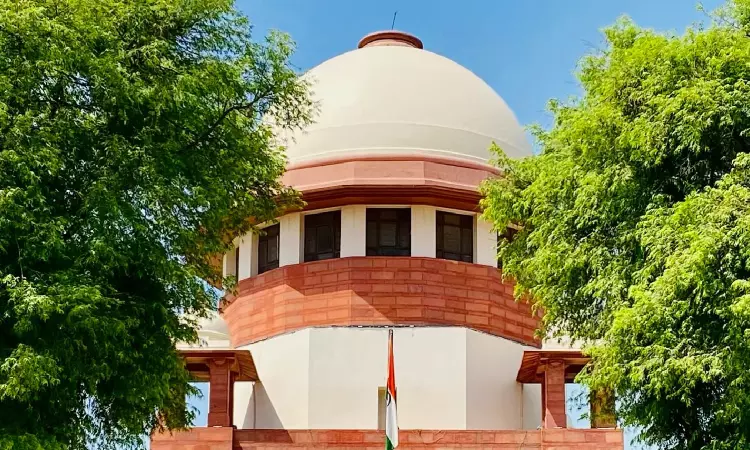- Home
- /
- Supreme court
- /
- Supreme Court Grants Relief To...
Supreme Court Grants Relief To Tribal Woman Denied Job For One-Day Delay In Medical Test
Yash Mittal
24 Sept 2025 11:35 AM IST
The Supreme Court has granted relief to a Scheduled Tribe candidate whose selection for a government post was cancelled merely because she reported one day late for the medical examination, despite having cleared the preliminary, mains, and interview stages. The candidate appeared for the medical test the 'next day' after the entire interview process, while the Jhakhand Public...
The Supreme Court has granted relief to a Scheduled Tribe candidate whose selection for a government post was cancelled merely because she reported one day late for the medical examination, despite having cleared the preliminary, mains, and interview stages.
The candidate appeared for the medical test the 'next day' after the entire interview process, while the Jhakhand Public Service Commission required her to appear the day after her own interview. Observing that the phrase 'next day' was ambiguous and undefined in the advertisement, the bench of Justices Vikram Nath and Sandeep Mehta set aside the Jharkhand High Court's decision, which justified the Appellants' rejection as valid.
The Court ruled that her candidature rejection was 'disproportionate and unjust.'
Relying on Uday Shankar Triyar v. Ram Kalewar Prasad Singh, (2006) 1 SCC 75, the Court reiterated that the procedural aspect is handmade directive that should not become a tool to defeat substantive rights.
“In the present case, the Instructions issued by respondent no. 3 prima facie does seem to be non-discriminate and must be followed in its letter and spirit but we cannot turn our heads to ignore the thread of ambiguity that runs through it. This is in addition to absence of any mechanism providing redressal in case a candidate fails to appear in medical examination.”, the Court said.
Further, the Court applied the concept of "prohibition of indirect discrimination" from Nitisha v. Union of India (a gender equality case) to the context of caste and marginalized communities. It said that State as a model employer, has a constitutional duty under Articles 14, 15, and 16 to ensure its policies do not indirectly discriminate.
The Court implied that procedural hurdles often disproportionately affect marginalized candidates and the system must be lenient to ensure their upliftment, not find ways to reject them.
"As a model employer, the State and its instrumentalities are expected to act in compliance with the equality principles as enshrined in the Constitution of India. However, laws that do appear to be providing for equality and are non-discriminatory in nature, do have a potential to be discriminatory. This Court in the case of Nitisha v. Union of India, has recognised and adopted in our equality jurisprudence the principle of prohibition of indirect discrimination. The Court held that even neutral, innocent or good faith measures and policies adopted with no discriminatory intent whatsoever, will be caught if their impact on persons having a particular characteristic is greater than their impact on other persons and thus, this is the whole point of prohibition of indirect discrimination.”, the Court said.
“The appellant belongs to a marginalized community, being member of Scheduled Tribe, has already proven her merit by qualifying the Preliminary Examination, Mains Examination and thereafter successfully appeared before the Interview Board and got her documents verified on time as per the schedule prescribed by respondent no. 3. It is her case since the very beginning that she was under the impression that the medical examination was scheduled on the following day after the interviews of all the candidates is conducted, i.e. 17th May, 2022, while as per the Press Advertisement she was required to be present on 16th May, 2022, which was the day following her interview day. We thus, have no hesitation to hold that non-appearance for medical examination without there being a proper clarity of which day the candidate is expected to appear is discriminatory qua the present appellant.”, the court added.
Accordingly, the appeal was allowed, and the Court directed the respondents to take Appellant's medical test, and upon finding her medically fit she shall be appointed by creating a supernumerary post with all benefits of seniority and increments.
Cause Title: SHREYA KUMARI TIRKEY VERSUS THE STATE OF JHARKHAND & ORS.
Citation : 2025 LiveLaw (SC) 937
Click here to read/download the order
Appearance:
For Petitioner(s) :Mr. Neeraj Shekhar, AOR Mrs. Kshama Sharma, Adv. Mr. Ramendra Vikram Singh, Adv. Mr. Rajesh Maurya, Adv. Mr. Ujjwal Ashutosh, Adv.
For Respondent(s) :Ms. Pallavi Langar, AOR Mr. Himanshu Shekhar, AOR Mr. Parth Shekhar, Adv. Mr. Vijay Singh, Adv. Mr. Surajit Basu, Adv. Mr. Kirtikar Sukul, Adv. Ms. Aarti Harish Bhandari, Adv. Mr. Ugranath Kumar, Adv.



